B-hPD-1/hPCSK9 mice
| Strain Name |
C57BL/6-Pdcd1tm1(PDCD1)BcgenPcsk9tm1(PCSK9)Bcgen/Bcgen
|
Common Name | B-hPD-1/hPCSK9 mice |
| Background | C57BL/6 | Catalog number | 111861 |
|
Related Genes |
PDCD1 (Programmed death-1,as known as PD-1); proprotein convertase subtilisin/kexin type 9, FH3, FHCL3, HCHOLA3, LDLCQ1, NARC-1, NARC1, PC9 |
||
mRNA expression analysis
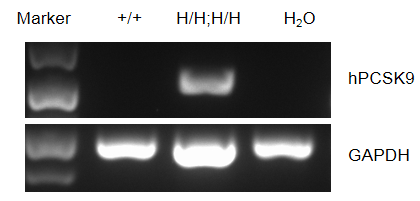
Strain specific analysis of PCSK9 mRNA expression in wild-type C57BL/6 mice and B-hPD-1/hPCSK9 mice by RT-PCR. Liver RNA were isolated from wild-type C57BL/6 mice (+/+) and homozygous B-hPD-1/hPCSK9 mice (H/H;H/H), then cDNA libraries were synthesized by reverse transcription, followed by PCR with human PCSK9 primers. Human PCSK9 mRNA was detectable only in homozygous B-hPD-1/hPCSK9 mice.
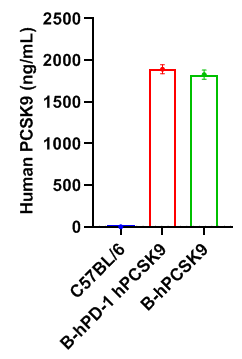
Strain specific PCSK9 expression analysis in homozygous B-hPD-1/hPCSK9 mice by ELISA. Serum were collected from wild-type mice C57BL/6 mice (+/+) and homozygous B-hPD-1/hPCSK9 mice (H/H;H/H), and analyzed by ELISA with species-specific PCSK9 ELISA kit. Human PCSK9 was exclusively detectable in homozygous B-hPD-1/hPCSK9 mice and B-hPCSK9 mice but not in wild-type mice.
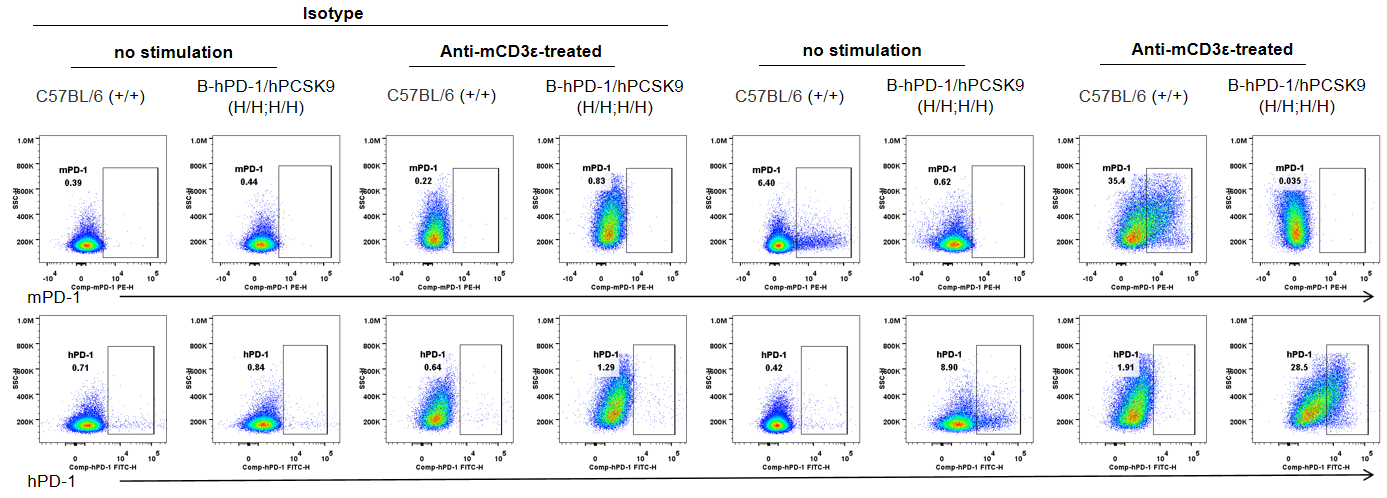
Strain specific PD-1 expression analysis in homozygous B-hPD-1/hPCSK9 mice by flow cytometry. Splenocytes were collected from wild-type C57BL/6 mice (+/+) and homozygous B-hPD-1/hPCSK9 mice (H/H;H/H) stimulated with Anti-CD3ε in vivo (7.5μg/mice, stimulation for 24h, i.p.), and analyzed by flow cytometry with species-specific anti-PD-1 antibody. Human PD-1 was exclusively detected in T cells in homozygous B-hPD-1/hPCSK9 mice but not in wild-type mice. Mouse PD-1 was detected only in wild-type mice.
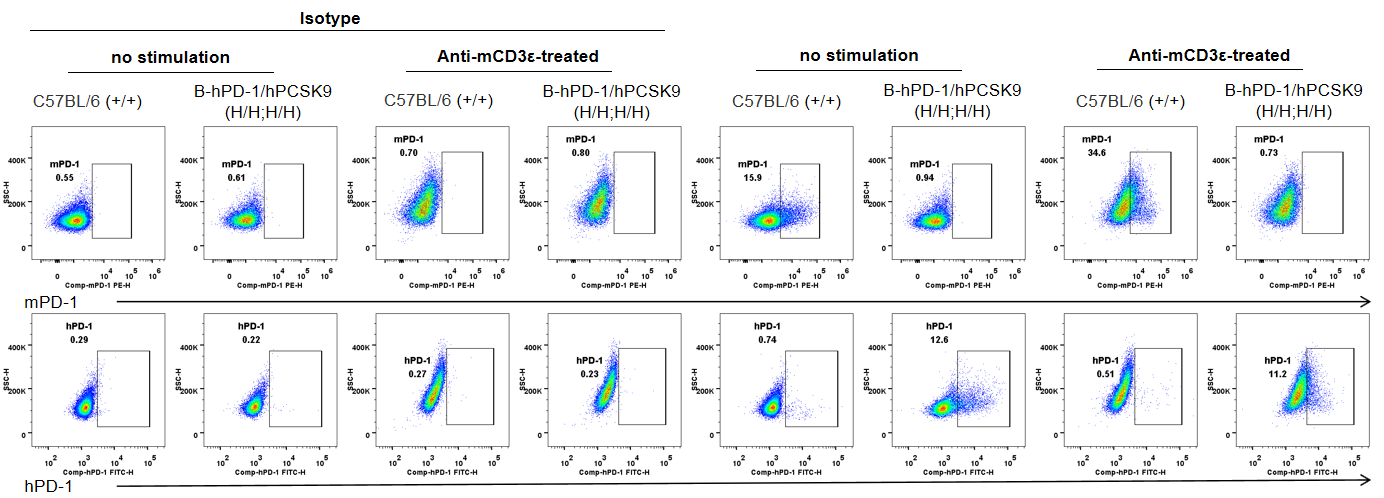
Strain specific PD-1 expression analysis in homozygous B-hPD-1/hPCSK9 mice by flow cytometry. Splenocytes were collected from wild-type C57BL/6 mice (+/+) and homozygous B-hPD-1/hPCSK9 mice (H/H;H/H) stimulated with Anti-CD3ε in vivo (7.5μg/mice, stimulation for 24h, i.p.), and analyzed by flow cytometry with species-specific anti-PD-1 antibody. Human PD-1 was exclusively detected in CD4+ T cells in homozygous B-hPD-1/hPCSK9 mice but not in wild-type mice. Mouse PD-1 was detected only in wild-type mice.
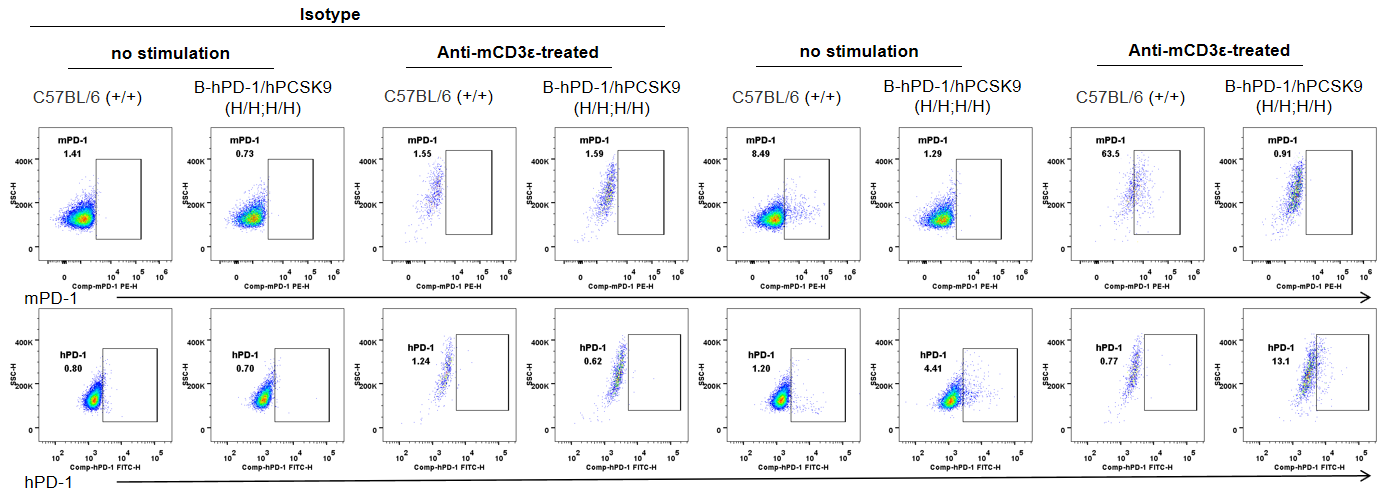
Strain specific PD-1 expression analysis in homozygous B-hPD-1/hPCSK9 mice by flow cytometry. Splenocytes were collected from wild-type C57BL/6 mice (+/+) and homozygous B-hPD-1/hPCSK9 mice (H/H;H/H) stimulated with Anti-CD3ε in vivo (7.5μg/mice, stimulation for 24h, i.p.), and analyzed by flow cytometry with species-specific anti-PD-1 antibody. Human PD-1 was exclusively detected in CD8+ T cells in homozygous B-hPD-1/hPCSK9 mice but not in wild-type mice. Mouse PD-1 was detected only in wild-type mice.
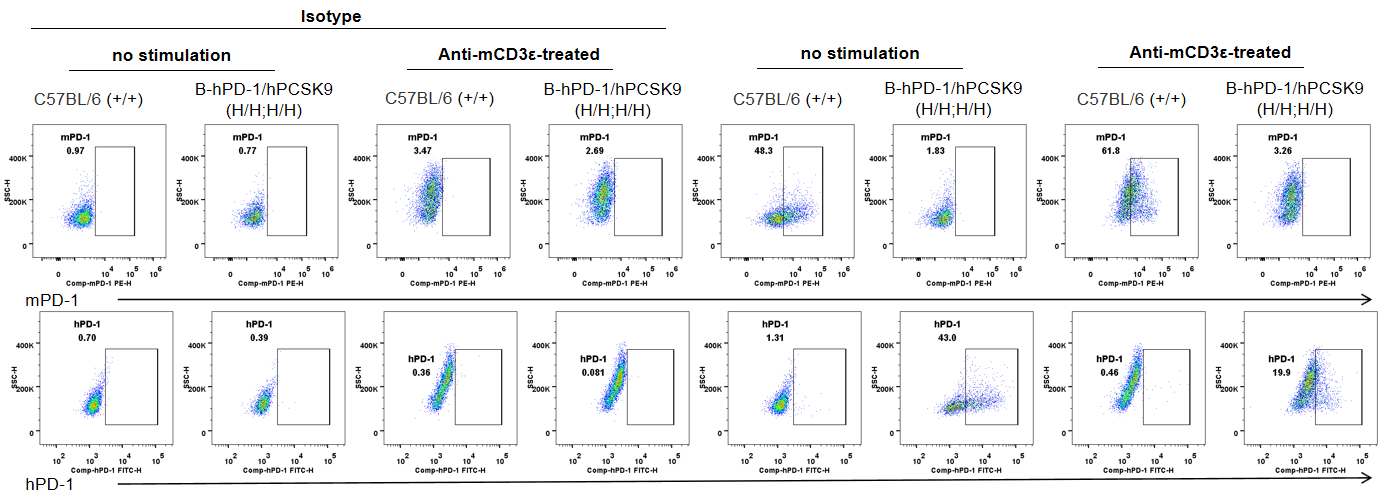
Strain specific PD-1 expression analysis in homozygous B-hPD-1/hPCSK9 mice by flow cytometry. Splenocytes were collected from wild-type C57BL/6 mice (+/+) and homozygous B-hPD-1/hPCSK9 mice (H/H;H/H) stimulated with Anti-CD3ε in vivo (7.5μg/mice, stimulation for 24h, i.p.), and analyzed by flow cytometry with species-specific anti-PD-1 antibody. Human PD-1 was exclusively detected in Treg cells in homozygous B-hPD-1/hPCSK9 mice but not in wild-type mice. Mouse PD-1 was detected only in wild-type mice.









